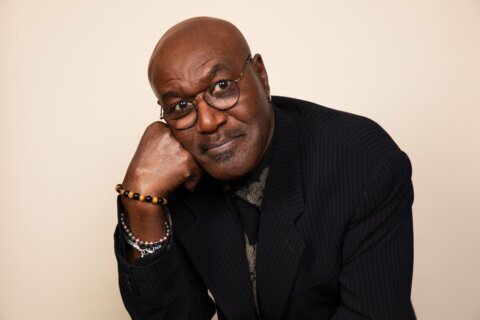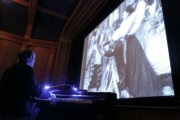▶ Watch Video: Barbra Streisand on her long-awaited memoir
Descend to the basement of Barbra Streisand’s Malibu home, and you’ll be transported to her own private mall – yes, a mall. One of the “stores” is Bee’s Doll Shop. It’s a poor girl’s fantasy brought to life, Streisand-style.
“I love to collect,” Streisand said. “I love antiques. [As a child] I didn’t have a doll, so I put hot water into a hot water bottle, which felt like a real person.”
“Wow, Barbra,” said King. “I think that you’ve made up for not having a doll when you were a child.”
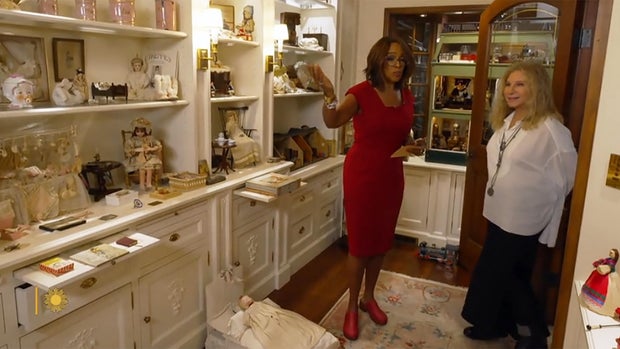
Further down the mall: the wardrobe of her extraordinary life, with gowns she wore to meet President Kennedy and the Queen of England, along with clothes fit for a Second Hand Rose. “These are things I bought in the thrift shop,” Streisand said. “Feel the velvet. This was ten bucks! I feel right in something that had a life in it. In other words, something from the past that I felt like I was once there.”
In her new memoir, “My Name Is Barbra” (published November 7 by Viking), Streisand takes us there, giving us a front row seat to her singular six-decade career as a singer, actor and director, along the way dishing about past loves and regrets, and setting the record straight.
When asked what she wanted readers to get out of the book, Streisand replied, “I want them to know the truth. I love truth. One of the reasons I wrote the book is to talk about the myths about me.”
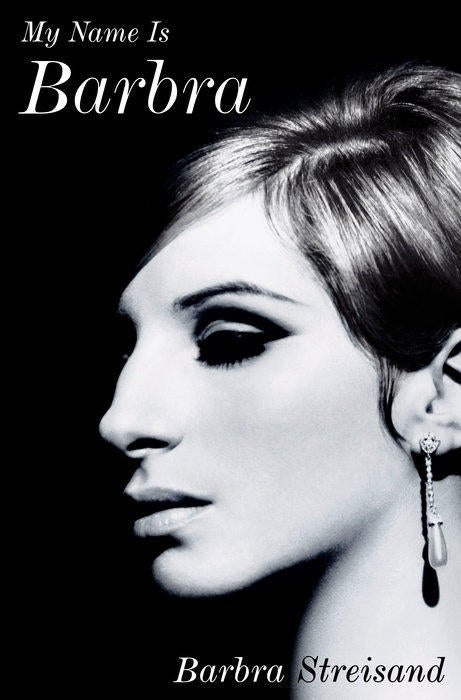
The singer praised for her peerless voice is also known as an exacting perfectionist, and she makes no apologies. In her memoir she writes, “A man is forceful – a woman is pushy. … He shows leadership – she’s controlling. …. If he acts, produces, and directs, he’s called a multitalented hyphenate. She’s called vain and egotistical.”
“I don’t think of myself as a famous person, I just don’t,” Streisand said. “I’m the same Barbara Joan Streisand as I was in high school.”
Growing up in Brooklyn, Streisand was a confident kid and a good student: “But I had a D in conduct, because if they didn’t call on me and I had the answer, I would just blurt it out!”
She says the death of her dad, Emanuel, when she was just 15 months old left a hole in her life: “I was angry that I didn’t have a father. I remember saying to my mother, ‘Why didn’t you ever tell me about my father?’ And she said, ‘I didn’t want you to miss him.'”
Streisand’s mom, Diana, widowed at 34 with two young children, is described in the book as cold and unsupportive.
“She didn’t seem very affectionate to you,” said King.
“Well, she didn’t believe in it,” Streisand replied. “I said, ‘Mom, how come you don’t ever, like, hug me? Or say the words, I love you?’ And she said, ‘You know, my mother and father, they never hugged me, but I knew they loved me.’ Now, I said, ‘Well, I didn’t know you loved me.'”
Her talent would rescue her. “I knew I had a good voice at five years old,” she said. “We kids used to gather on the stoop and we would harmonize, and I was the girl with no father and a good voice.”
At 13, Streisand’s mother paid to make her first record. Before long, she met her longtime manager Marty Ehrlichman while singing at a Greenwich Village night club. “Marty found me at 19 at the Bon Soir,” Streisand said, “and he wanted to get me a record contract. Columbia Records will sign me, but I said, ‘I don’t care what they pay me, I just need creative control.’ Now, he said to me, ‘Creative control? You’re 19, you’re nobody. You know, I don’t know if I can get that for you.'”
King said, “Not too many 19-year-olds, by the way, are asking for creative control.”
“Probably not! But to me, they saw me at the Bon Soir. They said, ‘She’s singing these cockamamie songs like Who’s Afraid of the Big Bad Wolf one minute, the next one is Sleeping Bee. I was being in the moment. I wanted to be an actress. I did not want to be a singer. I had to pay the rent, so I entered a talent contest and won, right? But I was able to use the techniques I learned in acting classes to make it interesting for me to sing a song.”
Take the snappy standard “Happy Days Are Here Again.” Streisand slowed it down and made it her own:
As she writes in her book, that would lead to a memorable duet with Judy Garland, on “The Judy Garland Show” in 1963.
Streisand said, “I fell in love with her. And her voice is spectacular. But when I sang with her, I was noticing her fragility. And she held my hand through our duet. I wondered why she was nervous.”
“Later we became friends. I remember her coming to my apartment. And I thought, ‘Now I know what she’s frightened about.’ That’s what happens when you have a long career. It doesn’t get easier; it gets harder. And you have no fear when, you know, ‘You’re gonna be famous, you’re not gonna be famous.'”
King asked, “You don’t have fear today?”
“I don’t have fear today? Of course! I don’t want to sing any more in public.”
The perilous fame Streisand dreamed of came with a starring role on Broadway, playing the part of Fanny Brice. “Funny Girl,” she said, “meant the world to me. It was everything I imagined wanting a play to be for me. To have serious relationships. To have comedy. To sing great songs.”
But as she writes, “Funny Girl”‘s success came at a steep price – she had a contract to fulfill: “Now I would have to be onstage doing the same thing every night for eighteen months. It was like a prison sentence to me.”
King asked, “But it’s hard to do the same thing over and over? Singing the same songs over and over?”
“God, yeah,” Streisand said. “You just f***ing bore yourself. It’s very boring.”
“For the audience that’s sitting there, for some of them, it’s the first time they’ve seen it. So, they’re not bored.”
“I’m not them!”
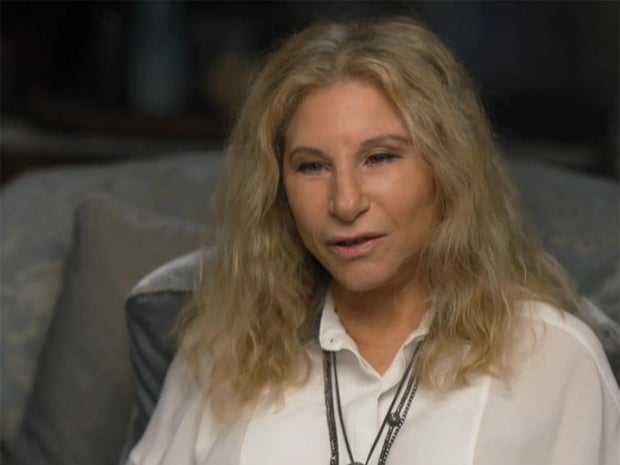
And that was part of Streisand’s appeal: there had never been anyone quite like her, right down to her distinctive nose. She writes that, for many years, people had said she should “do something” about her nose, or her teeth. “And I thought, ‘Why would I take off my bump? It makes me look more unique.'”
Her performance in the film version of “Funny Girl” won her an Oscar, and launched her movie career, playing comedy in “What’s Up, Doc,” and capturing the magic of an opposites-attract romance in “The Way We Were.” That film, along with a remake of “A Star Is Born,” cemented her status has a major box office draw.
With “Yentl,” Streisand took on the first of three films that she would direct. “I love directing,” Streisand said, “because it’s a complete vision. … It calls on every aspect of yourself: Decorating, visualizing, helping actors achieve a performance that I have in my mind for them.”
After an early marriage to actor Elliott Gould, with whom she had a son, Jason, the cast of Streisand’s real-life romances included a politician (Prime Minister Pierre Trudeau), actors (Don Johnson, Ryan O’Neal), and even a tennis star (Andre Agassi).
“Listen, I didn’t want to write about any of them,” Streisand said. But, “My editor said, ‘You have to leave some blood on the page!'”
King said, “I like knowing that Barbra had a very nice dating roster. I like that, myself. Did you have a good time?”
“With the men in my life, yes.”
Streisand was in her 50s when she was set up with actor James Brolin at a dinner party. She had quite an opening line: “I walked by him, touched his hair, and said, ‘Who f***ed up your hair?’ Because that was the truth. … What else was I gonna say? Hello, my name is Barbra. I mean, what?”
King asked Brolin, “Some people could’ve been turned off by that kind of directness. You were not. That was attractive to you, right?”
“Very,” he replied. “It was instant. It was like a wand went, Bing. Uh, oh, you’re screwed.”
They’ve been married for 25 years.
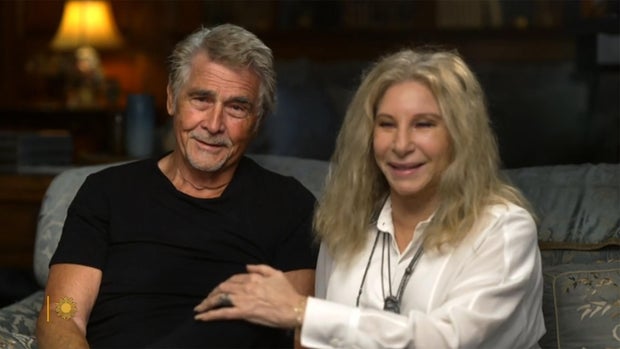
When asked what he thinks is the biggest misconception people have about Streisand, Brolin replied, “Well, there’s a lotta little girl in there. A lot. And therefore, it was covered up with a lot of firmness about how she’d like life to be and how she’d like to have things done.”
At 81, Barbra Streisand can look back on quite a life and legacy. When asked what makes her happy, she replied, “I love when people write me and they say, ‘I played you at my wedding.’ ‘That song helped me get through cancer.’ When I help people through my music or film, that’s what makes me feel good, that I’ve earned my right to be born, you know, that I earned my right to be here, and to reap the success that has been lathered on me.”
To listen to the Barbra Streisand album “Evergreens – Celebrating Six Decades on Columbia Records” click on the embed below (Free Spotify registration required to hear the tracks in full):
For more info:
- “My Name Is Barbra” by Barbra Streisand (Viking), in Hardcover, eBook and Audio formats, available November 7 via Amazon, Barnes & Noble and Bookshop.org
- barbrastreisand.com (Official site)
Story produced by Reid Orvedahl. Editor: Lauren Barnello.
For more of Gayle King’s interview with Barbra Streisand tune in to “CBS Mornings” Monday, November 6.
Click here for Mo Rocca’s report on how Barbra Streisand “became” Barbra
See also:
- Barbra Streisand’s “Encore” (“Sunday Morning”)
- Barbra Streisand: The way she still is (“Sunday Morning”)
- Her name is Barbra (“Sunday Morning”)
- Barbra Streisand, Beanie Feldstein, and the original “Funny Girl,” Fanny Brice (“Sunday Morning”)


